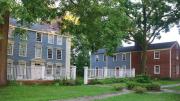Harvard Law School (HLS) has committed $500,000 to support the Royall House and Slave Quarters, a public museum in Medford, Massachusetts. The gift, announced today, comes as part of a new partnership with the nonprofit meant to bolster collaboration on future research and educational programming.
In the eighteenth century, the Royall House plantation was home to the Royalls, the largest slaveholding family in Massachusetts. At least 60 enslaved women, men, and children, whose forced labor helped build the family’s wealth, also lived on the site. Now open as a museum and educational center, the property represents one of the only remaining freestanding slave quarters in the northern United States. Harvard’s connection to the family and the surviving property runs deep. A 1781 bequest to Harvard College from Isaac Royall Jr. helped establish HLS: the donation funded a professorship that was ultimately transferred to, and contributed to the development of, Harvard’s fledgling law school in 1817. The school’s shield, designed in 1937, recognized the Royall family. The sheild was retired at the recommendation of an HLS working group and at the request of then-Dean Martha Minow (and it was replaced in 2021).
“Our community has for a number of years grappled with the painful history associated with the Law School’s founding,” said Dean and professor of law John F. Manning in the announcement. “Our work with the Royall House and Slave Quarters will help us continue together to acknowledge, learn from, and share with others our complicated history, to honor and commemorate the enslaved people whose labor generated wealth that contributed to the establishment of our law school, and to better understand and address the ongoing legacy of slavery in today’s society.” Harvard’s slave legacy has long been a source of discussion and sometimes conflict that culminated last spring in a comprehensive report prepared by the Presidential Committee on Harvard and the Legacy of Slavery (formed in 2019 by President Lawrence S. Bacow). The HLS gift and partnership are one result of the report, as the University implements recommendations.
As a museum, the Royall plantation offers a moving experience of both an acknowledgment and remembrance of history. The stories told through guided tours, exhibited artifacts and documents, and through other special events help shed light on Greater Boston’s early development and accumulated wealth—and the relationship of both to human bondage—in pre-Revolutionary Massachusetts. But the site also, importantly, highlights the political and legal activism of enslaved and free black people in eighteenth-century New England. “To understand contemporary society, we all must contend with the history of slavery and the institutions it founded and shaped in our own backyards,” Kyera Singleton, executive director of the Royall House and Slave Quarters, said in the announcement. “Harvard Law School’s investment in our museum and our mission will help us continue to make the history of northern slavery accessible.” (For the academic year 2021-22 she was also an American Democracy Fellow at Harvard’s Charles Warren Center for Studies in American History.)
HLS’s financial support will help fund the site’s operating costs and the development of new community programming. In addition, HLS, the Faculty of Arts and Sciences, and the Warren Center will work with museum staff to form additional opportunities for Harvard students and others within the University community to visit the site.








